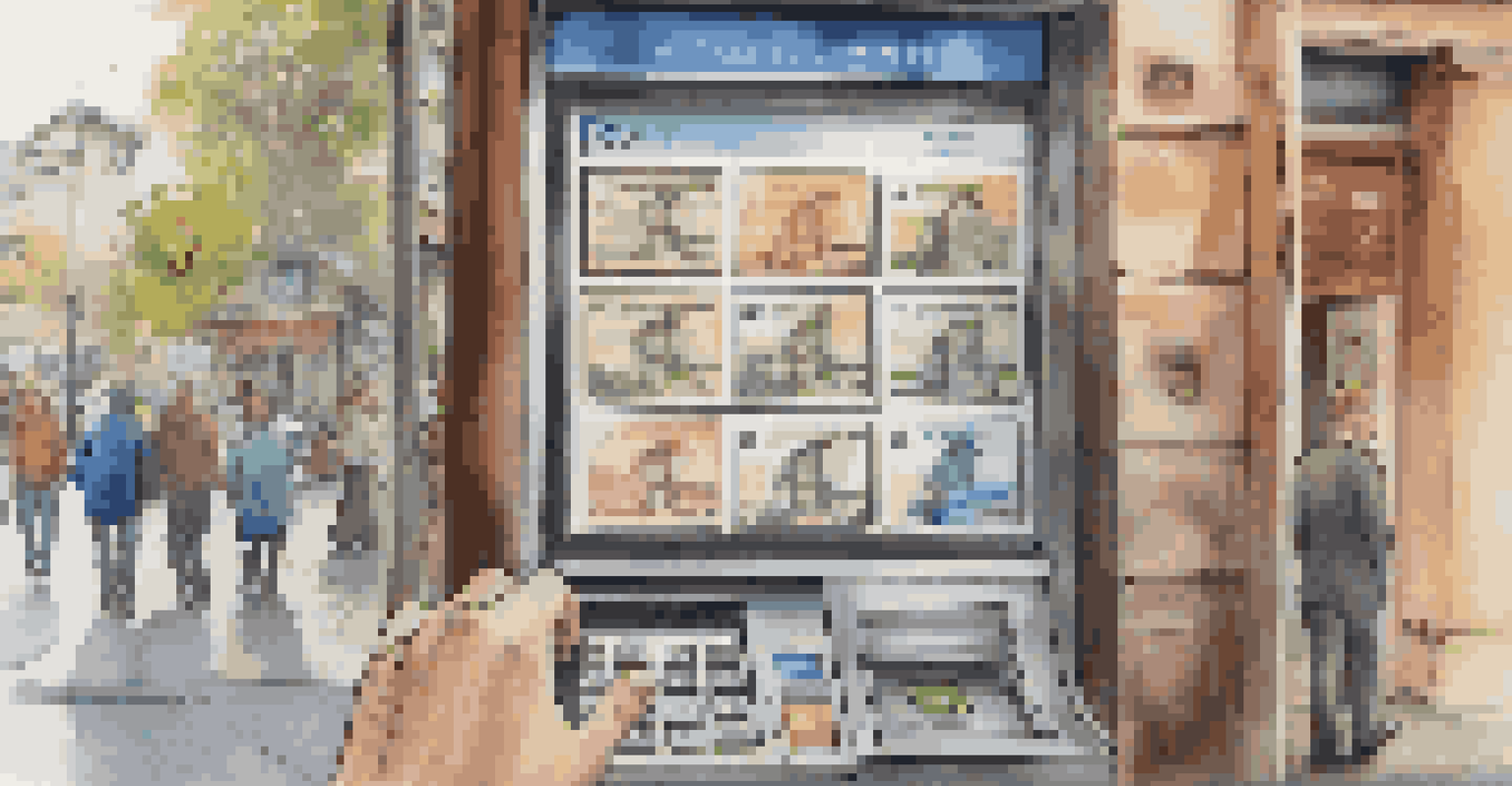Navigating Currency Exchange: Tips for Travelers Abroad

Understanding Currency Exchange Basics for Travelers
Before you embark on your journey, it's essential to grasp the basics of currency exchange. Every country has its own currency, and understanding how exchange rates work can save you money. For instance, knowing whether you're getting a fair rate when exchanging your dollars for euros can help you make informed decisions.
A penny saved is a penny earned.
Exchange rates fluctuate based on various factors, including economic stability and market demand. It's helpful to check current rates online or via a currency converter app before you travel. This way, you’ll have a benchmark to compare against when you're ready to exchange your money.
Additionally, be aware that some places charge a fee for currency exchange services. Whether you're at an airport, a bank, or a local exchange booth, knowing the fees involved can prevent you from overpaying. Always ask about the rates and fees before making any transactions.
Best Places to Exchange Currency While Traveling
When it comes to exchanging currency, not all locations are created equal. Airports, while convenient, often offer the least favorable rates. Instead, consider using local banks or ATMs that may provide better rates with lower fees, especially if you have a debit card that waives international transaction fees.

Another option is to use currency exchange services in city centers, where rates can be more competitive. However, be cautious and ensure that the service is reputable. Reading reviews or asking locals for recommendations can guide you to the best spots.
Know Currency Exchange Basics
Understanding how currency exchange rates work and being aware of fees can save you money while traveling.
Lastly, some travelers prefer to exchange a small amount of cash before departing to avoid any last-minute hassles. This way, you’ll have enough local currency for immediate expenses like transport or meals upon arrival.
Using ATMs Abroad: Tips and Tricks
Withdrawing cash from ATMs abroad can be one of the most cost-effective ways to get local currency. Before you leave, inform your bank about your travels to avoid any blocks on your card due to suspicious activity. This simple step can save you a lot of frustration when you need cash in a hurry.
The best way to predict your future is to create it.
When using ATMs, choose to be charged in the local currency rather than your home currency. This practice, known as Dynamic Currency Conversion, often comes with hidden fees and a poor exchange rate. Opting for local currency ensures you’re getting the best deal possible.
Keep an eye on your bank's withdrawal limits and any potential fees per transaction. Some banks may have international partnerships that allow for fee-free withdrawals, so do a bit of research ahead of time. Being well-prepared can make accessing cash a breeze.
Avoiding Currency Exchange Scams
Unfortunately, scams can happen anywhere, especially in tourist-heavy areas. One common trick is the 'too good to be true' exchange rate offered by street vendors. Always compare rates with established businesses before making any decisions.
Be wary of anyone who approaches you offering to exchange money, as these individuals may be operating illegal schemes. It's safer to stick to recognized exchange services or banks where you can verify the legitimacy of the transaction.
Choose Smart Exchange Locations
Opt for local banks or ATMs for better rates and avoid airport exchange booths that often offer less favorable terms.
Lastly, use common sense: if something feels off, trust your instincts and walk away. Your safety and security should always come first when handling your finances abroad.
Understanding Fees and Charges When Exchanging Currency
When exchanging currency, understanding the various fees involved is crucial for budgeting. Different services charge different fees, and sometimes hidden charges can sneak up on you. Always ask for a clear breakdown of any fees before proceeding with an exchange.
For example, some establishments might charge a flat fee per transaction, while others might take a percentage of the total amount exchanged. Knowing this ahead of time can help you choose the service that offers the best value.
Remember, the goal is to maximize the amount of local currency you receive for your money. By being informed about potential fees, you can make smarter choices and keep more cash in your pocket for enjoying your trip.
Using Credit and Debit Cards Wisely While Traveling
Credit and debit cards can be incredibly convenient when traveling abroad. They often provide competitive exchange rates, and many cards come with travel rewards or cash back benefits. Just be sure to check if your card has foreign transaction fees, as these can add up quickly.
When using your card, always opt to pay in the local currency to avoid unfavorable conversion rates. This practice ensures you're getting the best exchange rate available and helps you avoid hidden fees.
Plan Your Currency Budget
Estimating your cash needs and monitoring expenses can help you manage your budget effectively during your travels.
Additionally, it’s wise to carry a backup payment method in case your card gets lost or stolen. Having a small amount of cash on hand can provide peace of mind when technology fails, allowing you to navigate your travels without stress.
Planning Ahead: Setting a Currency Exchange Budget
Budgeting for currency exchange is an essential part of travel planning. Before you leave, estimate how much cash you'll need for your daily expenses, such as meals, transportation, and attractions. This foresight can help you avoid the pitfalls of over-exchanging or running out of cash.
Consider creating a daily budget that includes both cash and card expenses. Knowing how much you plan to spend can help you gauge how much currency to exchange at once, preventing unnecessary trips to the exchange counter.

Lastly, monitor your spending while traveling. Keeping track of your expenses can help you stay within your budget and make adjustments as needed. A little planning goes a long way in ensuring a smooth travel experience.
Final Thoughts: Mastering Currency Exchange for Travel
Navigating currency exchange can seem daunting, but with a bit of knowledge and preparation, it becomes a manageable part of your travel experience. From understanding exchange rates to knowing where to exchange your money, being informed empowers you to make smart financial decisions abroad.
Always keep safety in mind, avoid scams, and choose reputable services when exchanging currency. With the right approach, you can enjoy your travels without the worry of financial missteps.
Ultimately, being proactive about currency exchange allows you to focus on what truly matters: exploring new places, meeting new people, and creating unforgettable memories. Safe travels!